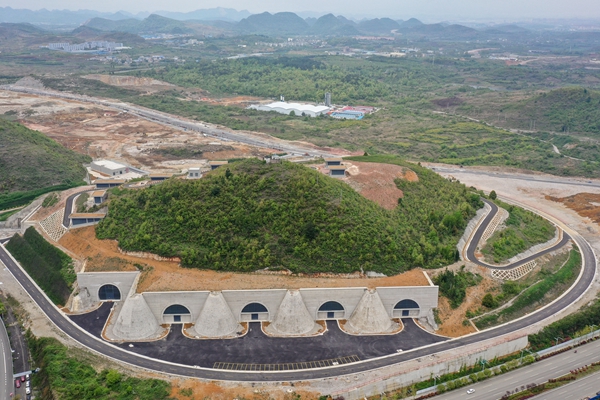Tencent ramps up efforts to develop new infrastructures
- By Zhu Bochen
 0 Comment(s)
0 Comment(s) Print
Print E-mail China.org.cn, May 23, 2020
E-mail China.org.cn, May 23, 2020

In a written proposal to the "two sessions," Tencent chairman and CEO Pony Ma suggested focusing on the R&D of "new infrastructures," building cybersecurity capabilities, and promoting the digitalized transformation of all sectors.
"The digital economy in China is marching toward a new era which is based on new infrastructures. It emphasizes data and will feature industrial internet when developing to a higher level," Ma wrote in his proposal.
The concept of "new infrastructures" was first put forward at the Central Economic Work Conference in late 2018. It was later refined to include seven sectors: 5G infrastructure, ultra-high-voltage power, intercity high-speed railways and transit, power stations for new energy vehicles, big data centers, artificial intelligence, and the industrial internet.
While China's consumption and exports — the two main drivers of growth in its economy — have declined to a certain extent amid the COVID-19 pandemic, the country's digital economy has instead been booming.
According to statistics from Tencent, since the epidemic outbreak, the company's health QR code has been used over 8 billion times. Meanwhile, its online health portal Tencent Healthcare has received more than 10 billion inquiries regarding COVID-19 updates, and provided online clinical services over 15 million times.
In addition, more than 100 million students have used Tencent products for distance learning, and daily active users for its video conferencing products have exceeded 10 million. All of these have greatly contributed to the resumption of normal life and social order.
"The epidemic has made us realize more than ever that connectivity is fundamental to economic growth," wrote Ma in a recent article for the People's Daily.
Since Tencent first announced its strategic upgrading and restructuring in 2018, the tech giant has been working to develop new infrastructure projects, so as to "embrace the industrial internet while maintaining its roots in the consumer internet."
"Essentially, new infrastructures and the industrial internet make data, algorithms and computing power accessible to everyone and every company at the lowest cost and highest efficiency, so as to share the latest scientific and technological achievements with the world," Ma explained in his article.
As for Tencent's experience in building the industrial internet, Tang Daosheng, senior executive vice president of Tencent, and president of the company's cloud and smart industry business group, believes that their capabilities are built on two aspects.
In a seminar earlier this March, Tang noted that Tencent had established a "tool kit" featuring core technologies such as Tencent Cloud, AI, 5G, big data, and the IoT, which provides leading digital capabilities for industrial upgrading in various fields.
Tang added that the advantages Tencent has in terms of its consumer-to-business operations model can help its clients and partners provide better services to individual consumers.
As China further accelerates its development of the Guangdong-Hong Kong-Macao Greater Bay Area, digital transformation and upgrading in the region have also seen rapid growth.
Statistics show that in the first quarter of this year, more than 1,300 projects, each of them worth more than 1 billion yuan, have started construction in Guangdong province, including several new infrastructure projects such as 5G base stations and data centers.
Regarding the current progress, Ma has proposed the promotion of smart manufacturing and development of fintech in the Greater Bay Area based on Tencent's expertise in these fields.
"Tencent will work to help sectors and industries in the Greater Bay Area go digital, and build a new ecosystem of industrial internet with our partners," wrote Ma. "We have faith that with the development of the industrial internet and new infrastructures, the Greater Bay Area will have a bright future."






Go to Forum >>0 Comment(s)